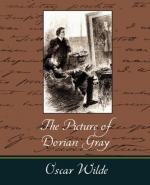“I must go, Basil,” he answered.
“Very well,” said Hallward, and he went over and laid down his cup on the tray. “It is rather late, and, as you have to dress, you had better lose no time. Good-bye, Harry. Good-bye, Dorian. Come and see me soon. Come to-morrow.”
“Certainly.”
“You won’t forget?”
“No, of course not,” cried Dorian.
“And ... Harry!”
“Yes, Basil?”
“Remember what I asked you, when we were in the garden this morning.”
“I have forgotten it.”
“I trust you.”
“I wish I could trust myself,” said Lord Henry, laughing. “Come, Mr. Gray, my hansom is outside, and I can drop you at your own place. Good-bye, Basil. It has been a most interesting afternoon.”
As the door closed behind them, the painter flung himself down on a sofa, and a look of pain came into his face.
CHAPTER 3
At half-past twelve next day Lord Henry Wotton strolled from Curzon Street over to the Albany to call on his uncle, Lord Fermor, a genial if somewhat rough-mannered old bachelor, whom the outside world called selfish because it derived no particular benefit from him, but who was considered generous by Society as he fed the people who amused him. His father had been our ambassador at Madrid when Isabella was young and Prim unthought of, but had retired from the diplomatic service in a capricious moment of annoyance on not being offered the Embassy at Paris, a post to which he considered that he was fully entitled by reason of his birth, his indolence, the good English of his dispatches, and his inordinate passion for pleasure. The son, who had been his father’s secretary, had resigned along with his chief, somewhat foolishly as was thought at the time, and on succeeding some months later to the title, had set himself to the serious study of the great aristocratic art of doing absolutely nothing. He had two large town houses, but preferred to live in chambers as it was less trouble, and took most of his meals at his club. He paid some attention to the management of his collieries in the Midland counties, excusing himself for this taint of industry on the ground that the one advantage of having coal was that it enabled a gentleman to afford the decency of burning wood on his own hearth. In politics he was a Tory, except when the Tories were in office, during which period he roundly abused them for being a pack of Radicals. He was a hero to his valet, who bullied him, and a terror to most of his relations, whom he bullied in turn. Only England could have produced him, and he always said that the country was going to the dogs. His principles were out of date, but there was a good deal to be said for his prejudices.
When Lord Henry entered the room, he found his uncle sitting in a rough shooting-coat, smoking a cheroot and grumbling over The Times. “Well, Harry,” said the old gentleman, “what brings you out so early? I thought you dandies never got up till two, and were not visible till five.”




